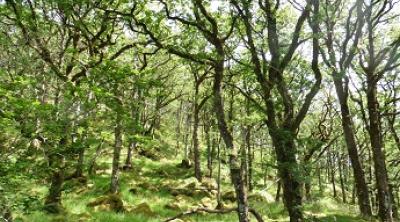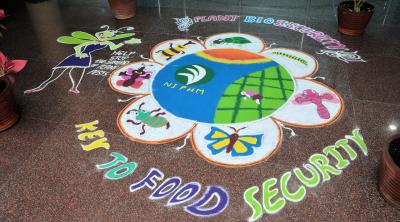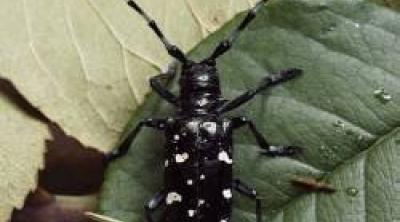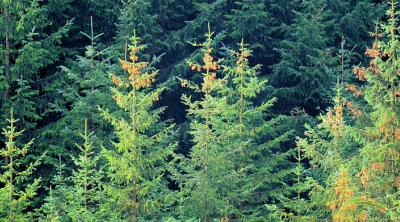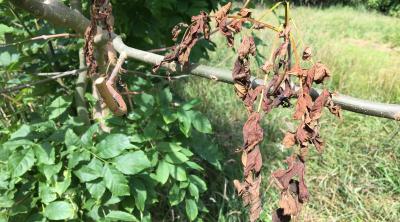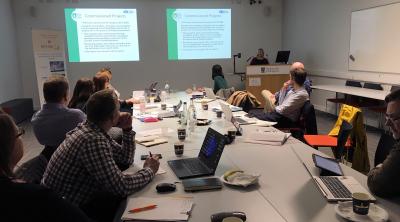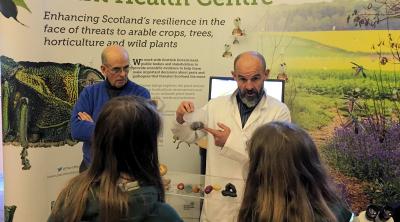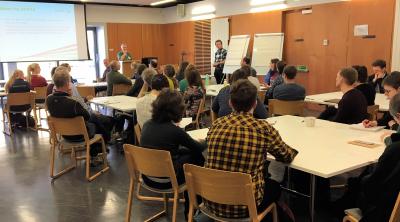News
Conserving oak- and ash-associated species in the face of pests and diseases
Ruth Mitchel from the Plant Health Centre team has written two articles on conserving oak- and ash-associated species in the face of oak and ash pests and diseases.
Oak trees have long had a reputation for supporting a lot of other species but until recently we had no idea just how many and what those species were. Recent work has listed 2300 species associated with oak, of which 320 are only found on oak and a further 229 species are rarely found on species other than oak.
Ash dieback is caused by a non-native fungus Hymenoscyphus fraxineus, which arrived into eastern Europe in the 1990’s on imported trees. Since then the fungus has spread eastward killing large numbers of ash trees (Fraxinus excelsior). The fungus was first confirmed in the UK in 2012, although it is now known to have been present in the UK for a lot longer. As of Feburary 2018 was found in 49% of 10 km squares in the UK.
Oak trees have long had a reputation for supporting a lot of other species but until recently we had no idea just how many and what those species were. Recent work has listed 2300 species associated with oak, of which 320 are only found on oak and a further 229 species are rarely found on species other than oak.
Ash dieback is caused by a non-native fungus Hymenoscyphus fraxineus, which arrived into eastern Europe in the 1990’s on imported trees. Since then the fungus has spread eastward killing large numbers of ash trees (Fraxinus excelsior). The fungus was first confirmed in the UK in 2012, although it is now known to have been present in the UK for a lot longer. As of Feburary 2018 was found in 49% of 10 km squares in the UK.
Sharing Scottish and Indian plant health expertise
Prof. Adam Kleczkowski and Dr. Vincent Keenan, both members of the Plant Health Centre, visited the National Institute of Plant Health Management in Hyderabad, India in April to take part in an international workshop on protecting food security in South East Asian countries by developing early-warning and ready response systems for invasive weed incursions.
130,000 trees to be planted across England to combat climate change
‘Trees are the lifeblood of our nation, and it is more important than ever to ensure they are rooted not only in our countryside, but in our towns and cities too’
More than 130,000 trees will be planted across towns and cities in England to help combat climate change, the government has said.
Grants totalling £10m will be made available through the Urban Tree Challenge Fund over the next two years.
The scheme, administered by the Forestry Commission, will be open to individuals, local authorities, charities and NGOs. Grants will cover the planting of trees and the first three years of their care.
More than 130,000 trees will be planted across towns and cities in England to help combat climate change, the government has said.
Grants totalling £10m will be made available through the Urban Tree Challenge Fund over the next two years.
The scheme, administered by the Forestry Commission, will be open to individuals, local authorities, charities and NGOs. Grants will cover the planting of trees and the first three years of their care.
Asian Longhorn Beetle eradicated in the UK
Great evidence that engaging the public can lead to early detection and increase the chances of successful eradication.
The Asian Longhorn Beetle (ALB) – an insect which poses a risk to broad-leaved trees such as oak and silver birch– has been eradicated in the UK following six years of trapping and surveillance work by the Animal and Plant Health Agency and the Forestry Commission.
The Asian Longhorn Beetle (ALB) – an insect which poses a risk to broad-leaved trees such as oak and silver birch– has been eradicated in the UK following six years of trapping and surveillance work by the Animal and Plant Health Agency and the Forestry Commission.
The battle to save Scotland's forests from disease
Following another news item this week on the economic impacts of ash dieback, Scottish Forestry's John Douglas describes the battle to defeat another deadly tree disease Phytophthora Ramorum.
"When I first saw the impact this disease was having, it really almost reduced me to tears."
The words of Scottish Forestry's John Dougan as he describes the battle to defeat the deadly tree disease Phytophthora Ramorum.
It has spread throughout Scotland in recent years, leaving thousands of dead and damaged trees in its wake.
If the ongoing fight is lost, it is feared it could be catastrophic for the forestry industry and also hit tourism.
As the busy summer holidays period approaches, members of the public are being urged to take some simple precautions which could help, such as cleaning their boots before leaving.
"When I first saw the impact this disease was having, it really almost reduced me to tears."
The words of Scottish Forestry's John Dougan as he describes the battle to defeat the deadly tree disease Phytophthora Ramorum.
It has spread throughout Scotland in recent years, leaving thousands of dead and damaged trees in its wake.
If the ongoing fight is lost, it is feared it could be catastrophic for the forestry industry and also hit tourism.
As the busy summer holidays period approaches, members of the public are being urged to take some simple precautions which could help, such as cleaning their boots before leaving.
Ash dieback: Killer tree disease set to cost UK £15bn
The outbreak of ash dieback disease is set to cost the UK in the region of £15bn, it has been estimated. Scientists expressed shock at the "staggering" financial burden on taxpayers.
The authors warn that the cost of tackling the fallout from ash dieback far exceeds the income from importing nursery trees.
It was an imported nursery tree that initially brought the deadly disease to these shores. They added that it was the first time the total cost of the outbreak had been estimated.
The authors warn that the cost of tackling the fallout from ash dieback far exceeds the income from importing nursery trees.
It was an imported nursery tree that initially brought the deadly disease to these shores. They added that it was the first time the total cost of the outbreak had been estimated.
Plant imports and exports in a no deal Brexit
New information has been published for UK importers and exporters of plant material to and from the EU in the event of a no deal Brexit. This information includes fact sheets, a number of scenarios and questions answered.
Centres of Expertise meet in Glasgow
All four Centres of Expertise (CREW, EPIC, CxC and PHC), together with SEFARI Gateway, met at the School of Veterinary Medicine, University of Glasgow to continue discussions on ways to work more closely together and to ensure a joined up approach to stakeholder engagement and knowledge transfer.
Careers Fair for children in North East Fife
Thanks to the North Fife Rotary Club for inviting the Plant Health Centre to meet Primary 6 and 7 pupils from North East Fife to discuss careers in plant health and the disadvantages of bringing plants home from abroad (as part of the 'Don't Risk It' campaign).
UK Climate Predictions 2018 workshop
Dr Mike Rivington from the James Hutton Institute, through funding from Sefari Gateway, held a workshop with relevant stakeholders across the organisations delivering the Scottish Government research portfolio, including the Centres of Expertise, and wider research community, business, agencies and policy communities to discuss ways to collectively use the UKCP18 climate predictions data most effectively. The aim was to develop a longer-term network of collaboration for knowledge and experience sharing.
The workshop was a knowledge exchange and elicitation opportunity at which stakeholders could learn about the new projections, detail their experience with the UKCP09, and facilitate co-construction of networking and further knowledge sharing on using the UKCP18.
The workshop was a knowledge exchange and elicitation opportunity at which stakeholders could learn about the new projections, detail their experience with the UKCP09, and facilitate co-construction of networking and further knowledge sharing on using the UKCP18.

